Entrepreneurship and Small Business Management Report: A Study
VerifiedAdded on 2020/11/23
|19
|5191
|251
Report
AI Summary
This report provides a comprehensive analysis of entrepreneurship and small business management. It begins by defining entrepreneurship and exploring various types of entrepreneurial ventures, including large-scale enterprises, small-scale enterprises, social enterprises, and scalable businesses, and relates these to different entrepreneurial typologies like female, male, lifestyle, and serial entrepreneurs. The report then compares and contrasts different entrepreneurial ventures, highlighting the similarities and differences between lifestyle and serial entrepreneurs, as well as male and female entrepreneurs. Furthermore, the report assesses the impact of micro and small businesses on the economy using relevant data and statistics, focusing on employment and turnover trends in the UK. The report also discusses the importance of small businesses and business start-ups for social economic growth. The report then delves into the characteristic traits and skills of successful entrepreneurs, differentiating them from other business managers, and explores how aspects of the entrepreneurial personality reflect entrepreneurial motivation and mindset. Finally, the report examines how background and experience can either hinder or foster entrepreneurship, providing a holistic view of the entrepreneurial process.

Entrepreneurship and
Small Business
Management
Small Business
Management
Paraphrase This Document
Need a fresh take? Get an instant paraphrase of this document with our AI Paraphraser
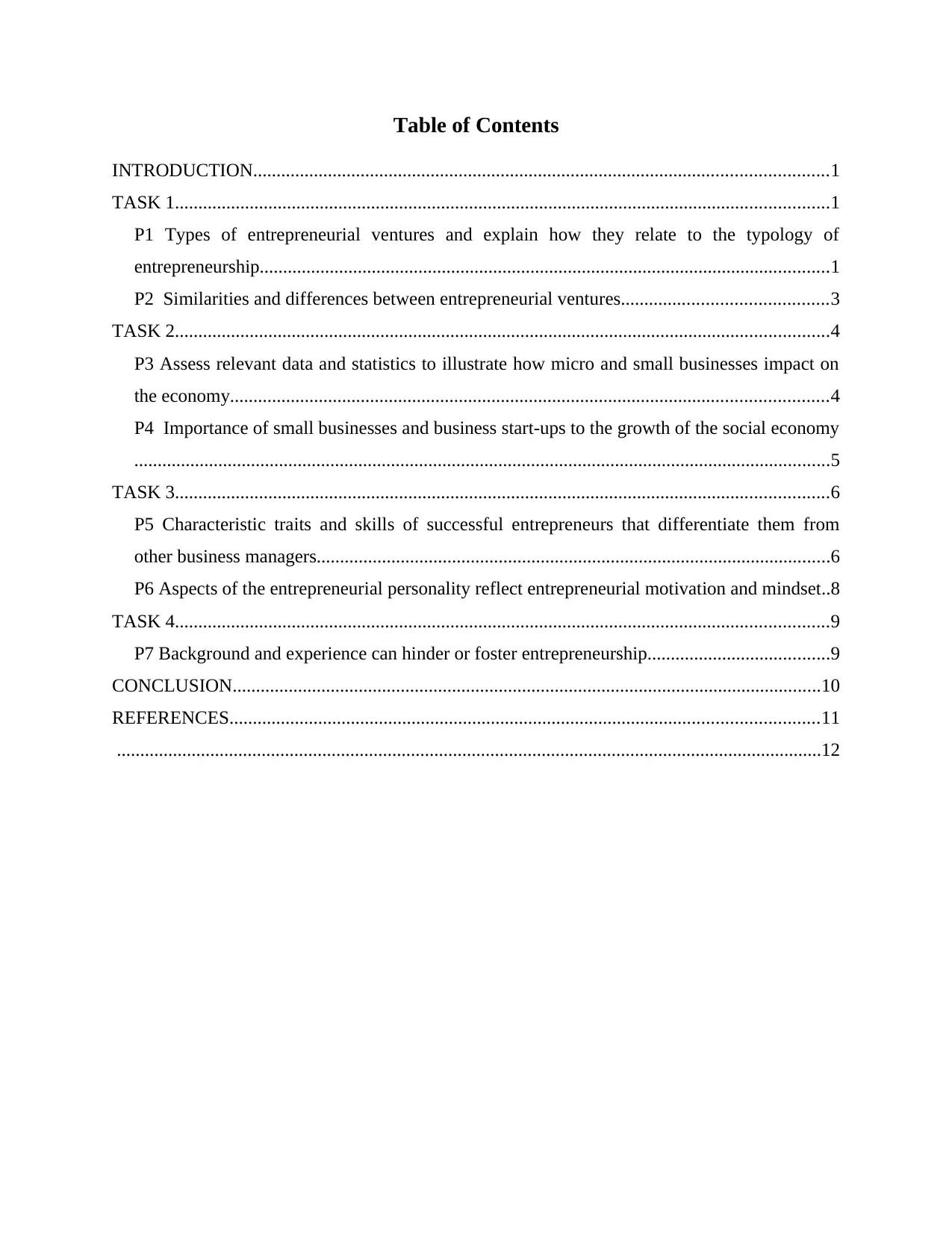
Table of Contents
INTRODUCTION...........................................................................................................................1
TASK 1............................................................................................................................................1
P1 Types of entrepreneurial ventures and explain how they relate to the typology of
entrepreneurship..........................................................................................................................1
P2 Similarities and differences between entrepreneurial ventures............................................3
TASK 2............................................................................................................................................4
P3 Assess relevant data and statistics to illustrate how micro and small businesses impact on
the economy................................................................................................................................4
P4 Importance of small businesses and business start-ups to the growth of the social economy
.....................................................................................................................................................5
TASK 3............................................................................................................................................6
P5 Characteristic traits and skills of successful entrepreneurs that differentiate them from
other business managers..............................................................................................................6
P6 Aspects of the entrepreneurial personality reflect entrepreneurial motivation and mindset..8
TASK 4............................................................................................................................................9
P7 Background and experience can hinder or foster entrepreneurship.......................................9
CONCLUSION..............................................................................................................................10
REFERENCES..............................................................................................................................11
.......................................................................................................................................................12
INTRODUCTION...........................................................................................................................1
TASK 1............................................................................................................................................1
P1 Types of entrepreneurial ventures and explain how they relate to the typology of
entrepreneurship..........................................................................................................................1
P2 Similarities and differences between entrepreneurial ventures............................................3
TASK 2............................................................................................................................................4
P3 Assess relevant data and statistics to illustrate how micro and small businesses impact on
the economy................................................................................................................................4
P4 Importance of small businesses and business start-ups to the growth of the social economy
.....................................................................................................................................................5
TASK 3............................................................................................................................................6
P5 Characteristic traits and skills of successful entrepreneurs that differentiate them from
other business managers..............................................................................................................6
P6 Aspects of the entrepreneurial personality reflect entrepreneurial motivation and mindset..8
TASK 4............................................................................................................................................9
P7 Background and experience can hinder or foster entrepreneurship.......................................9
CONCLUSION..............................................................................................................................10
REFERENCES..............................................................................................................................11
.......................................................................................................................................................12
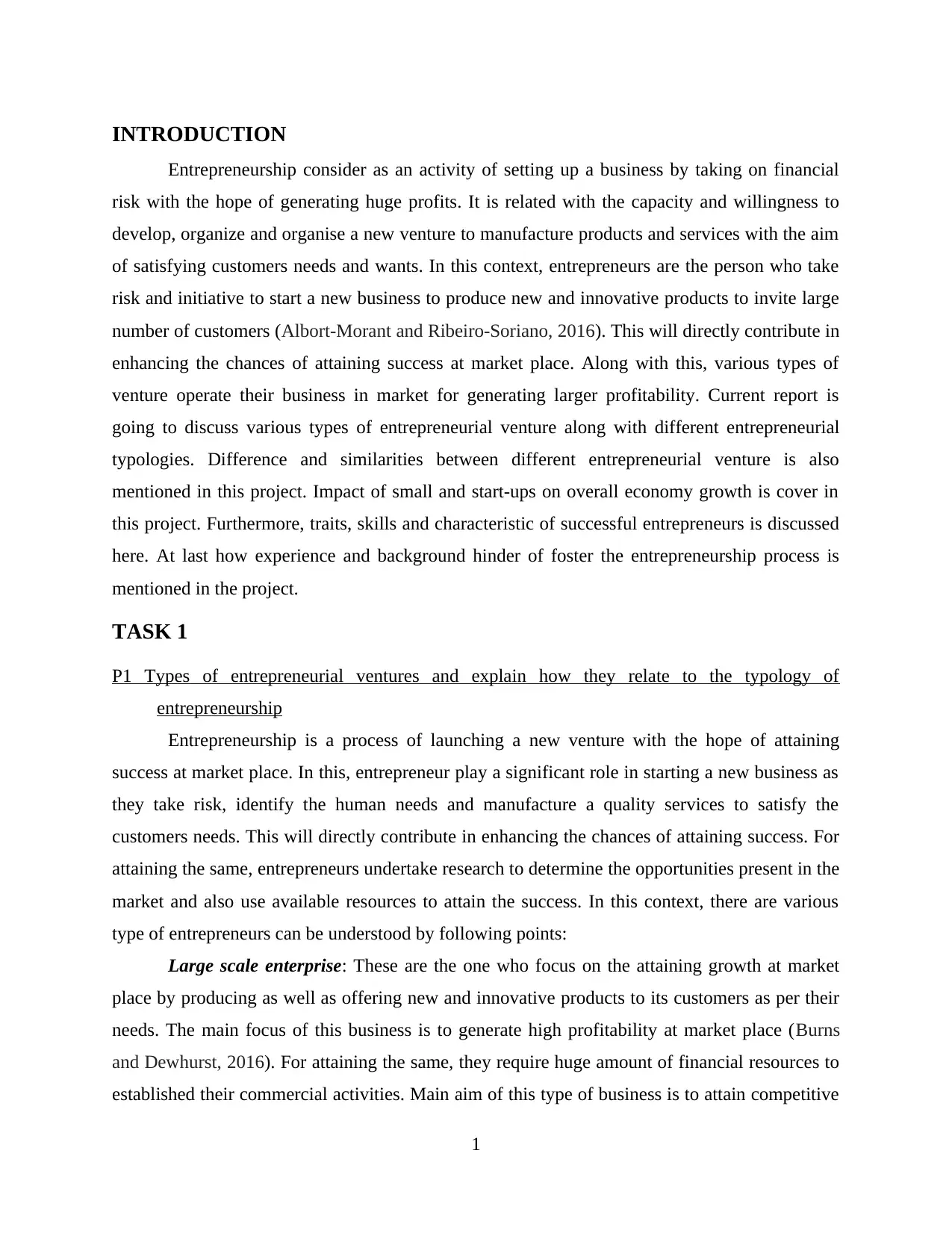
INTRODUCTION
Entrepreneurship consider as an activity of setting up a business by taking on financial
risk with the hope of generating huge profits. It is related with the capacity and willingness to
develop, organize and organise a new venture to manufacture products and services with the aim
of satisfying customers needs and wants. In this context, entrepreneurs are the person who take
risk and initiative to start a new business to produce new and innovative products to invite large
number of customers (Albort-Morant and Ribeiro-Soriano, 2016). This will directly contribute in
enhancing the chances of attaining success at market place. Along with this, various types of
venture operate their business in market for generating larger profitability. Current report is
going to discuss various types of entrepreneurial venture along with different entrepreneurial
typologies. Difference and similarities between different entrepreneurial venture is also
mentioned in this project. Impact of small and start-ups on overall economy growth is cover in
this project. Furthermore, traits, skills and characteristic of successful entrepreneurs is discussed
here. At last how experience and background hinder of foster the entrepreneurship process is
mentioned in the project.
TASK 1
P1 Types of entrepreneurial ventures and explain how they relate to the typology of
entrepreneurship
Entrepreneurship is a process of launching a new venture with the hope of attaining
success at market place. In this, entrepreneur play a significant role in starting a new business as
they take risk, identify the human needs and manufacture a quality services to satisfy the
customers needs. This will directly contribute in enhancing the chances of attaining success. For
attaining the same, entrepreneurs undertake research to determine the opportunities present in the
market and also use available resources to attain the success. In this context, there are various
type of entrepreneurs can be understood by following points:
Large scale enterprise: These are the one who focus on the attaining growth at market
place by producing as well as offering new and innovative products to its customers as per their
needs. The main focus of this business is to generate high profitability at market place (Burns
and Dewhurst, 2016). For attaining the same, they require huge amount of financial resources to
established their commercial activities. Main aim of this type of business is to attain competitive
1
Entrepreneurship consider as an activity of setting up a business by taking on financial
risk with the hope of generating huge profits. It is related with the capacity and willingness to
develop, organize and organise a new venture to manufacture products and services with the aim
of satisfying customers needs and wants. In this context, entrepreneurs are the person who take
risk and initiative to start a new business to produce new and innovative products to invite large
number of customers (Albort-Morant and Ribeiro-Soriano, 2016). This will directly contribute in
enhancing the chances of attaining success at market place. Along with this, various types of
venture operate their business in market for generating larger profitability. Current report is
going to discuss various types of entrepreneurial venture along with different entrepreneurial
typologies. Difference and similarities between different entrepreneurial venture is also
mentioned in this project. Impact of small and start-ups on overall economy growth is cover in
this project. Furthermore, traits, skills and characteristic of successful entrepreneurs is discussed
here. At last how experience and background hinder of foster the entrepreneurship process is
mentioned in the project.
TASK 1
P1 Types of entrepreneurial ventures and explain how they relate to the typology of
entrepreneurship
Entrepreneurship is a process of launching a new venture with the hope of attaining
success at market place. In this, entrepreneur play a significant role in starting a new business as
they take risk, identify the human needs and manufacture a quality services to satisfy the
customers needs. This will directly contribute in enhancing the chances of attaining success. For
attaining the same, entrepreneurs undertake research to determine the opportunities present in the
market and also use available resources to attain the success. In this context, there are various
type of entrepreneurs can be understood by following points:
Large scale enterprise: These are the one who focus on the attaining growth at market
place by producing as well as offering new and innovative products to its customers as per their
needs. The main focus of this business is to generate high profitability at market place (Burns
and Dewhurst, 2016). For attaining the same, they require huge amount of financial resources to
established their commercial activities. Main aim of this type of business is to attain competitive
1
⊘ This is a preview!⊘
Do you want full access?
Subscribe today to unlock all pages.

Trusted by 1+ million students worldwide
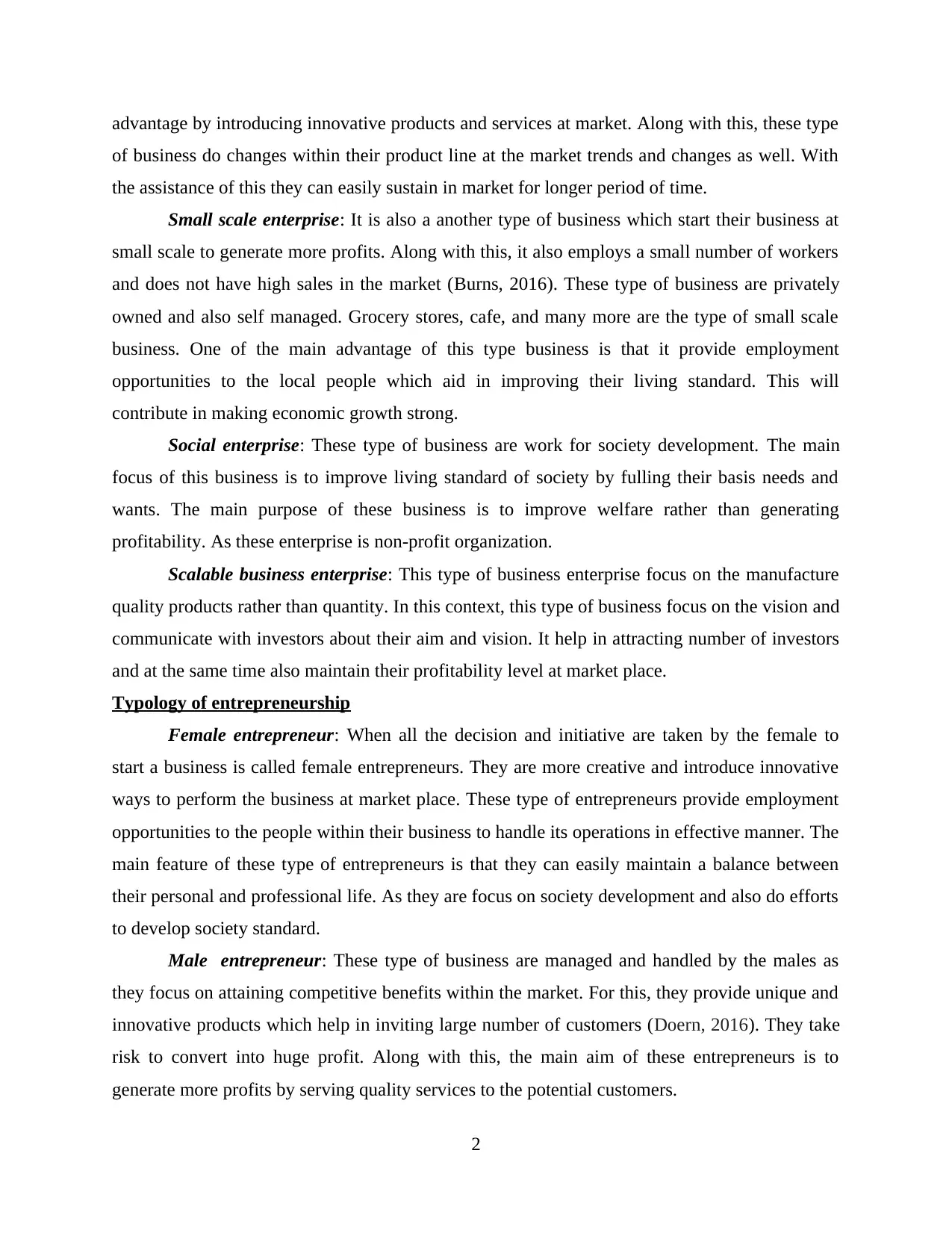
advantage by introducing innovative products and services at market. Along with this, these type
of business do changes within their product line at the market trends and changes as well. With
the assistance of this they can easily sustain in market for longer period of time.
Small scale enterprise: It is also a another type of business which start their business at
small scale to generate more profits. Along with this, it also employs a small number of workers
and does not have high sales in the market (Burns, 2016). These type of business are privately
owned and also self managed. Grocery stores, cafe, and many more are the type of small scale
business. One of the main advantage of this type business is that it provide employment
opportunities to the local people which aid in improving their living standard. This will
contribute in making economic growth strong.
Social enterprise: These type of business are work for society development. The main
focus of this business is to improve living standard of society by fulling their basis needs and
wants. The main purpose of these business is to improve welfare rather than generating
profitability. As these enterprise is non-profit organization.
Scalable business enterprise: This type of business enterprise focus on the manufacture
quality products rather than quantity. In this context, this type of business focus on the vision and
communicate with investors about their aim and vision. It help in attracting number of investors
and at the same time also maintain their profitability level at market place.
Typology of entrepreneurship
Female entrepreneur: When all the decision and initiative are taken by the female to
start a business is called female entrepreneurs. They are more creative and introduce innovative
ways to perform the business at market place. These type of entrepreneurs provide employment
opportunities to the people within their business to handle its operations in effective manner. The
main feature of these type of entrepreneurs is that they can easily maintain a balance between
their personal and professional life. As they are focus on society development and also do efforts
to develop society standard.
Male entrepreneur: These type of business are managed and handled by the males as
they focus on attaining competitive benefits within the market. For this, they provide unique and
innovative products which help in inviting large number of customers (Doern, 2016). They take
risk to convert into huge profit. Along with this, the main aim of these entrepreneurs is to
generate more profits by serving quality services to the potential customers.
2
of business do changes within their product line at the market trends and changes as well. With
the assistance of this they can easily sustain in market for longer period of time.
Small scale enterprise: It is also a another type of business which start their business at
small scale to generate more profits. Along with this, it also employs a small number of workers
and does not have high sales in the market (Burns, 2016). These type of business are privately
owned and also self managed. Grocery stores, cafe, and many more are the type of small scale
business. One of the main advantage of this type business is that it provide employment
opportunities to the local people which aid in improving their living standard. This will
contribute in making economic growth strong.
Social enterprise: These type of business are work for society development. The main
focus of this business is to improve living standard of society by fulling their basis needs and
wants. The main purpose of these business is to improve welfare rather than generating
profitability. As these enterprise is non-profit organization.
Scalable business enterprise: This type of business enterprise focus on the manufacture
quality products rather than quantity. In this context, this type of business focus on the vision and
communicate with investors about their aim and vision. It help in attracting number of investors
and at the same time also maintain their profitability level at market place.
Typology of entrepreneurship
Female entrepreneur: When all the decision and initiative are taken by the female to
start a business is called female entrepreneurs. They are more creative and introduce innovative
ways to perform the business at market place. These type of entrepreneurs provide employment
opportunities to the people within their business to handle its operations in effective manner. The
main feature of these type of entrepreneurs is that they can easily maintain a balance between
their personal and professional life. As they are focus on society development and also do efforts
to develop society standard.
Male entrepreneur: These type of business are managed and handled by the males as
they focus on attaining competitive benefits within the market. For this, they provide unique and
innovative products which help in inviting large number of customers (Doern, 2016). They take
risk to convert into huge profit. Along with this, the main aim of these entrepreneurs is to
generate more profits by serving quality services to the potential customers.
2
Paraphrase This Document
Need a fresh take? Get an instant paraphrase of this document with our AI Paraphraser
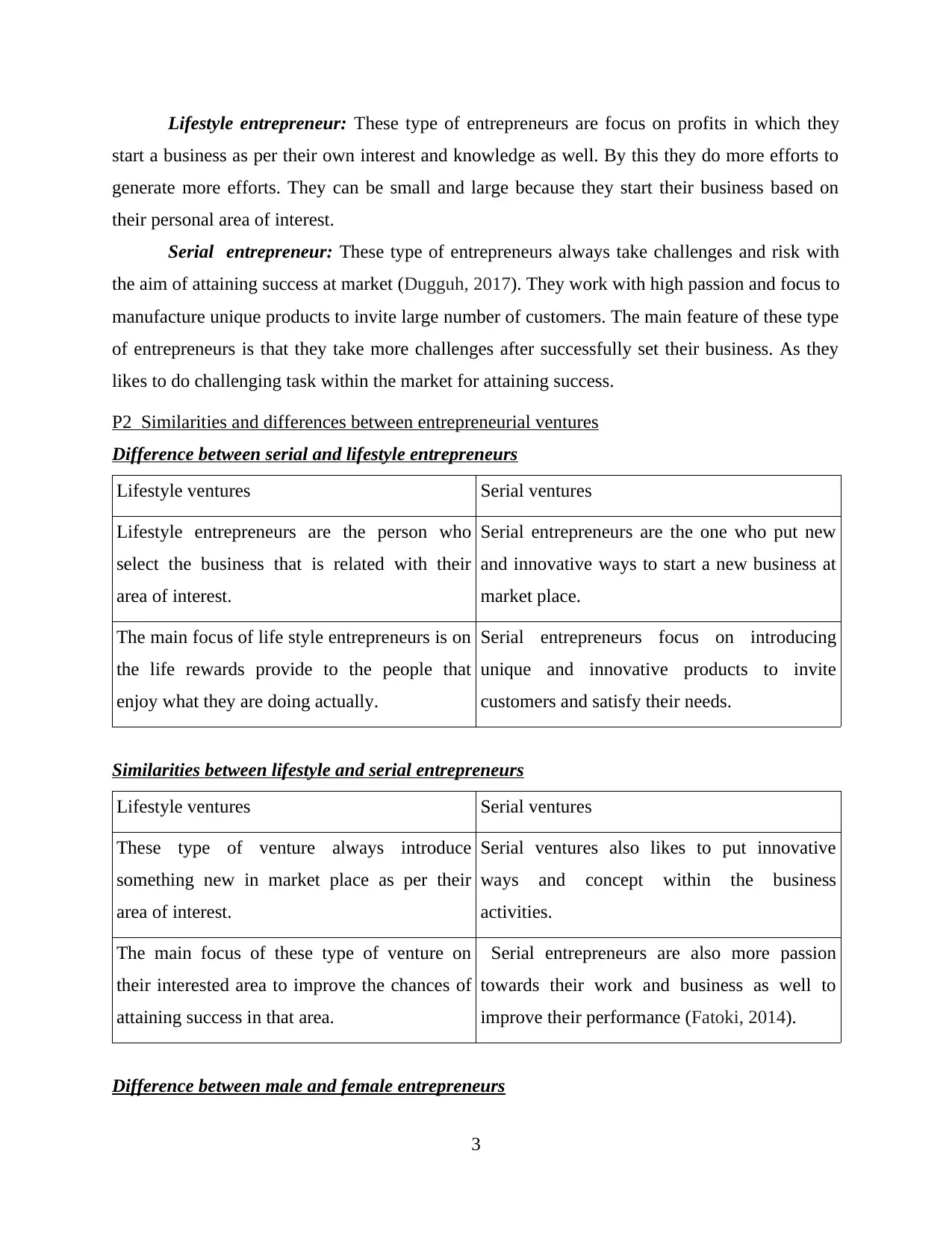
Lifestyle entrepreneur: These type of entrepreneurs are focus on profits in which they
start a business as per their own interest and knowledge as well. By this they do more efforts to
generate more efforts. They can be small and large because they start their business based on
their personal area of interest.
Serial entrepreneur: These type of entrepreneurs always take challenges and risk with
the aim of attaining success at market (Dugguh, 2017). They work with high passion and focus to
manufacture unique products to invite large number of customers. The main feature of these type
of entrepreneurs is that they take more challenges after successfully set their business. As they
likes to do challenging task within the market for attaining success.
P2 Similarities and differences between entrepreneurial ventures
Difference between serial and lifestyle entrepreneurs
Lifestyle ventures Serial ventures
Lifestyle entrepreneurs are the person who
select the business that is related with their
area of interest.
Serial entrepreneurs are the one who put new
and innovative ways to start a new business at
market place.
The main focus of life style entrepreneurs is on
the life rewards provide to the people that
enjoy what they are doing actually.
Serial entrepreneurs focus on introducing
unique and innovative products to invite
customers and satisfy their needs.
Similarities between lifestyle and serial entrepreneurs
Lifestyle ventures Serial ventures
These type of venture always introduce
something new in market place as per their
area of interest.
Serial ventures also likes to put innovative
ways and concept within the business
activities.
The main focus of these type of venture on
their interested area to improve the chances of
attaining success in that area.
Serial entrepreneurs are also more passion
towards their work and business as well to
improve their performance (Fatoki, 2014).
Difference between male and female entrepreneurs
3
start a business as per their own interest and knowledge as well. By this they do more efforts to
generate more efforts. They can be small and large because they start their business based on
their personal area of interest.
Serial entrepreneur: These type of entrepreneurs always take challenges and risk with
the aim of attaining success at market (Dugguh, 2017). They work with high passion and focus to
manufacture unique products to invite large number of customers. The main feature of these type
of entrepreneurs is that they take more challenges after successfully set their business. As they
likes to do challenging task within the market for attaining success.
P2 Similarities and differences between entrepreneurial ventures
Difference between serial and lifestyle entrepreneurs
Lifestyle ventures Serial ventures
Lifestyle entrepreneurs are the person who
select the business that is related with their
area of interest.
Serial entrepreneurs are the one who put new
and innovative ways to start a new business at
market place.
The main focus of life style entrepreneurs is on
the life rewards provide to the people that
enjoy what they are doing actually.
Serial entrepreneurs focus on introducing
unique and innovative products to invite
customers and satisfy their needs.
Similarities between lifestyle and serial entrepreneurs
Lifestyle ventures Serial ventures
These type of venture always introduce
something new in market place as per their
area of interest.
Serial ventures also likes to put innovative
ways and concept within the business
activities.
The main focus of these type of venture on
their interested area to improve the chances of
attaining success in that area.
Serial entrepreneurs are also more passion
towards their work and business as well to
improve their performance (Fatoki, 2014).
Difference between male and female entrepreneurs
3
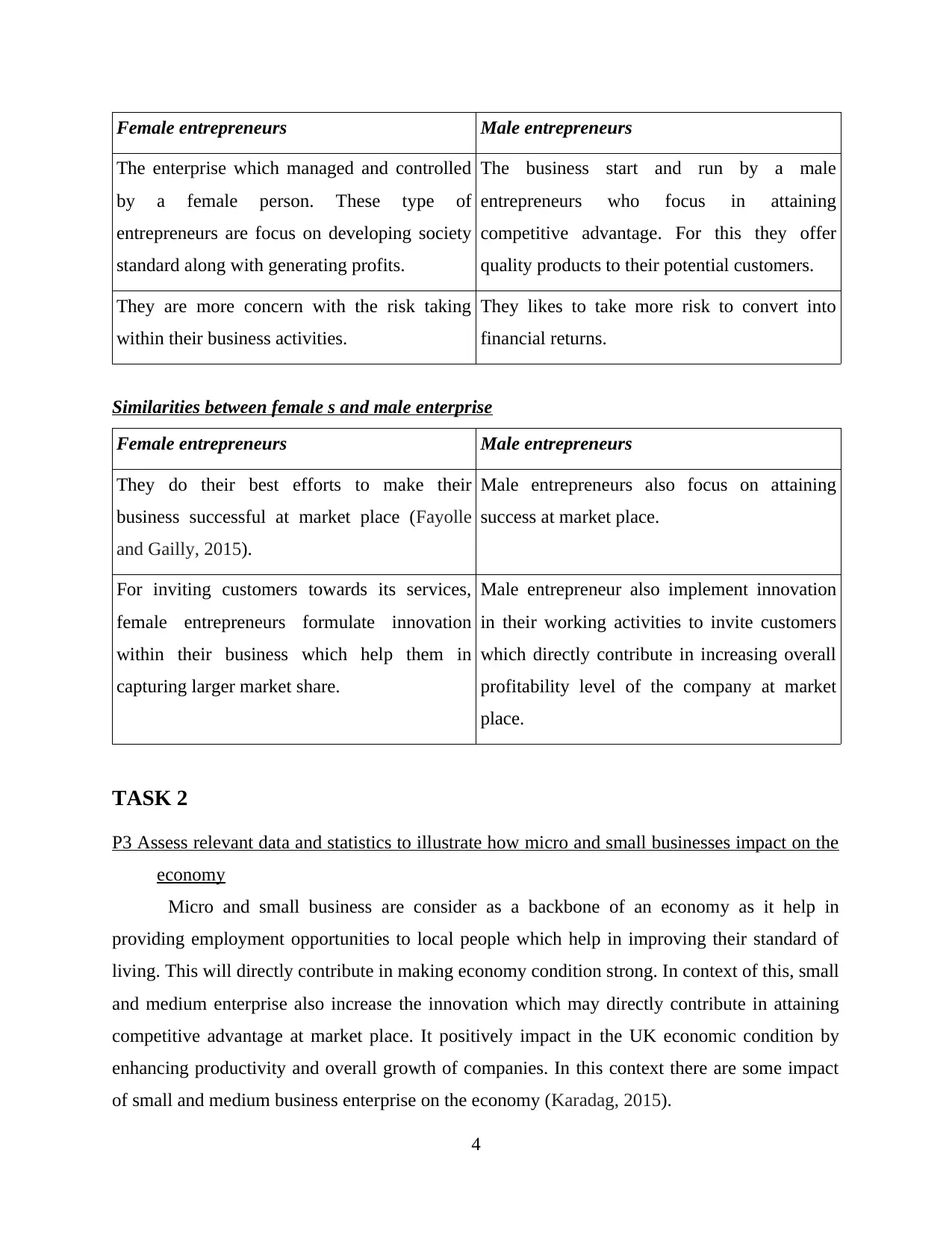
Female entrepreneurs Male entrepreneurs
The enterprise which managed and controlled
by a female person. These type of
entrepreneurs are focus on developing society
standard along with generating profits.
The business start and run by a male
entrepreneurs who focus in attaining
competitive advantage. For this they offer
quality products to their potential customers.
They are more concern with the risk taking
within their business activities.
They likes to take more risk to convert into
financial returns.
Similarities between female s and male enterprise
Female entrepreneurs Male entrepreneurs
They do their best efforts to make their
business successful at market place (Fayolle
and Gailly, 2015).
Male entrepreneurs also focus on attaining
success at market place.
For inviting customers towards its services,
female entrepreneurs formulate innovation
within their business which help them in
capturing larger market share.
Male entrepreneur also implement innovation
in their working activities to invite customers
which directly contribute in increasing overall
profitability level of the company at market
place.
TASK 2
P3 Assess relevant data and statistics to illustrate how micro and small businesses impact on the
economy
Micro and small business are consider as a backbone of an economy as it help in
providing employment opportunities to local people which help in improving their standard of
living. This will directly contribute in making economy condition strong. In context of this, small
and medium enterprise also increase the innovation which may directly contribute in attaining
competitive advantage at market place. It positively impact in the UK economic condition by
enhancing productivity and overall growth of companies. In this context there are some impact
of small and medium business enterprise on the economy (Karadag, 2015).
4
The enterprise which managed and controlled
by a female person. These type of
entrepreneurs are focus on developing society
standard along with generating profits.
The business start and run by a male
entrepreneurs who focus in attaining
competitive advantage. For this they offer
quality products to their potential customers.
They are more concern with the risk taking
within their business activities.
They likes to take more risk to convert into
financial returns.
Similarities between female s and male enterprise
Female entrepreneurs Male entrepreneurs
They do their best efforts to make their
business successful at market place (Fayolle
and Gailly, 2015).
Male entrepreneurs also focus on attaining
success at market place.
For inviting customers towards its services,
female entrepreneurs formulate innovation
within their business which help them in
capturing larger market share.
Male entrepreneur also implement innovation
in their working activities to invite customers
which directly contribute in increasing overall
profitability level of the company at market
place.
TASK 2
P3 Assess relevant data and statistics to illustrate how micro and small businesses impact on the
economy
Micro and small business are consider as a backbone of an economy as it help in
providing employment opportunities to local people which help in improving their standard of
living. This will directly contribute in making economy condition strong. In context of this, small
and medium enterprise also increase the innovation which may directly contribute in attaining
competitive advantage at market place. It positively impact in the UK economic condition by
enhancing productivity and overall growth of companies. In this context there are some impact
of small and medium business enterprise on the economy (Karadag, 2015).
4
⊘ This is a preview!⊘
Do you want full access?
Subscribe today to unlock all pages.

Trusted by 1+ million students worldwide
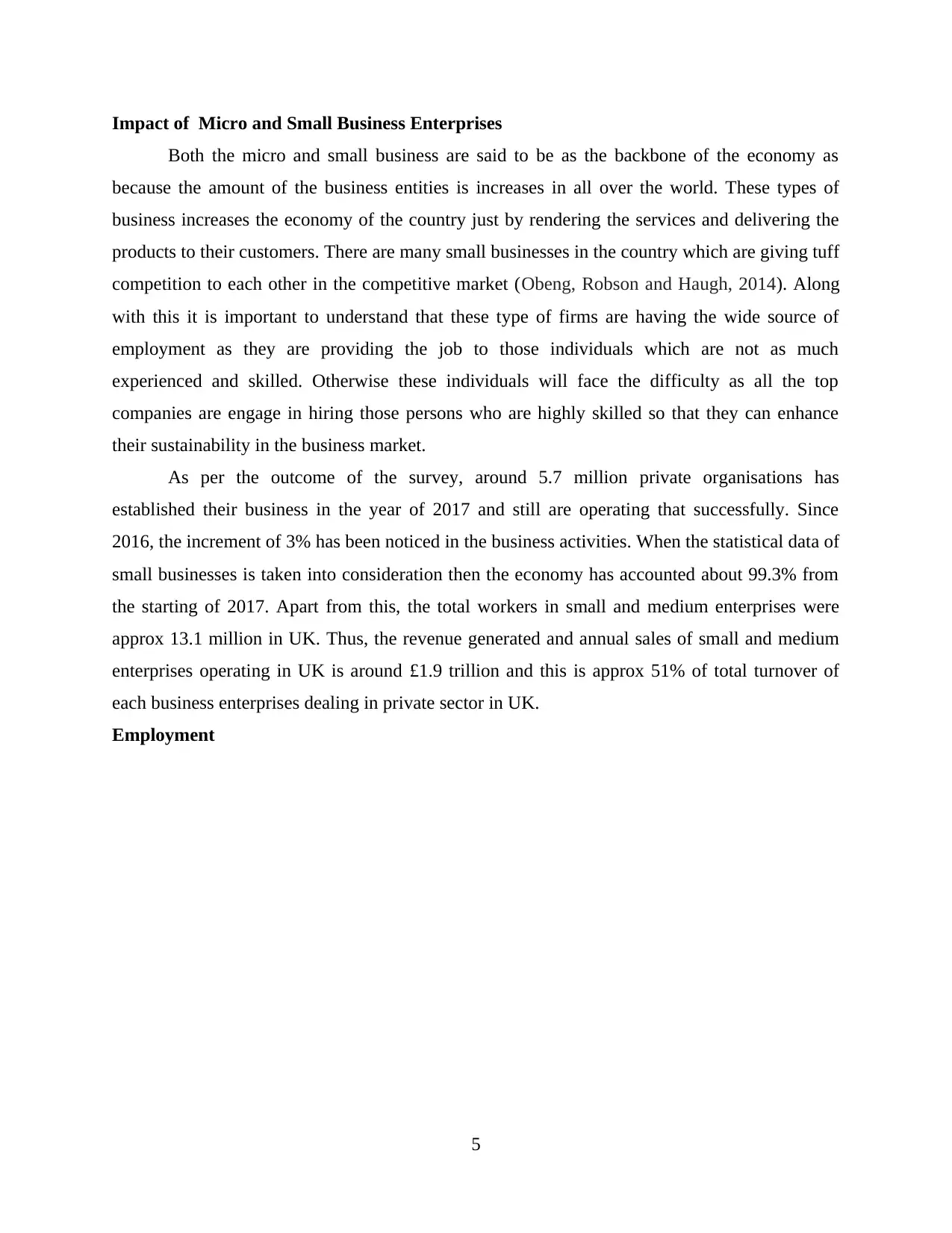
Impact of Micro and Small Business Enterprises
Both the micro and small business are said to be as the backbone of the economy as
because the amount of the business entities is increases in all over the world. These types of
business increases the economy of the country just by rendering the services and delivering the
products to their customers. There are many small businesses in the country which are giving tuff
competition to each other in the competitive market (Obeng, Robson and Haugh, 2014). Along
with this it is important to understand that these type of firms are having the wide source of
employment as they are providing the job to those individuals which are not as much
experienced and skilled. Otherwise these individuals will face the difficulty as all the top
companies are engage in hiring those persons who are highly skilled so that they can enhance
their sustainability in the business market.
As per the outcome of the survey, around 5.7 million private organisations has
established their business in the year of 2017 and still are operating that successfully. Since
2016, the increment of 3% has been noticed in the business activities. When the statistical data of
small businesses is taken into consideration then the economy has accounted about 99.3% from
the starting of 2017. Apart from this, the total workers in small and medium enterprises were
approx 13.1 million in UK. Thus, the revenue generated and annual sales of small and medium
enterprises operating in UK is around £1.9 trillion and this is approx 51% of total turnover of
each business enterprises dealing in private sector in UK.
Employment
5
Both the micro and small business are said to be as the backbone of the economy as
because the amount of the business entities is increases in all over the world. These types of
business increases the economy of the country just by rendering the services and delivering the
products to their customers. There are many small businesses in the country which are giving tuff
competition to each other in the competitive market (Obeng, Robson and Haugh, 2014). Along
with this it is important to understand that these type of firms are having the wide source of
employment as they are providing the job to those individuals which are not as much
experienced and skilled. Otherwise these individuals will face the difficulty as all the top
companies are engage in hiring those persons who are highly skilled so that they can enhance
their sustainability in the business market.
As per the outcome of the survey, around 5.7 million private organisations has
established their business in the year of 2017 and still are operating that successfully. Since
2016, the increment of 3% has been noticed in the business activities. When the statistical data of
small businesses is taken into consideration then the economy has accounted about 99.3% from
the starting of 2017. Apart from this, the total workers in small and medium enterprises were
approx 13.1 million in UK. Thus, the revenue generated and annual sales of small and medium
enterprises operating in UK is around £1.9 trillion and this is approx 51% of total turnover of
each business enterprises dealing in private sector in UK.
Employment
5
Paraphrase This Document
Need a fresh take? Get an instant paraphrase of this document with our AI Paraphraser
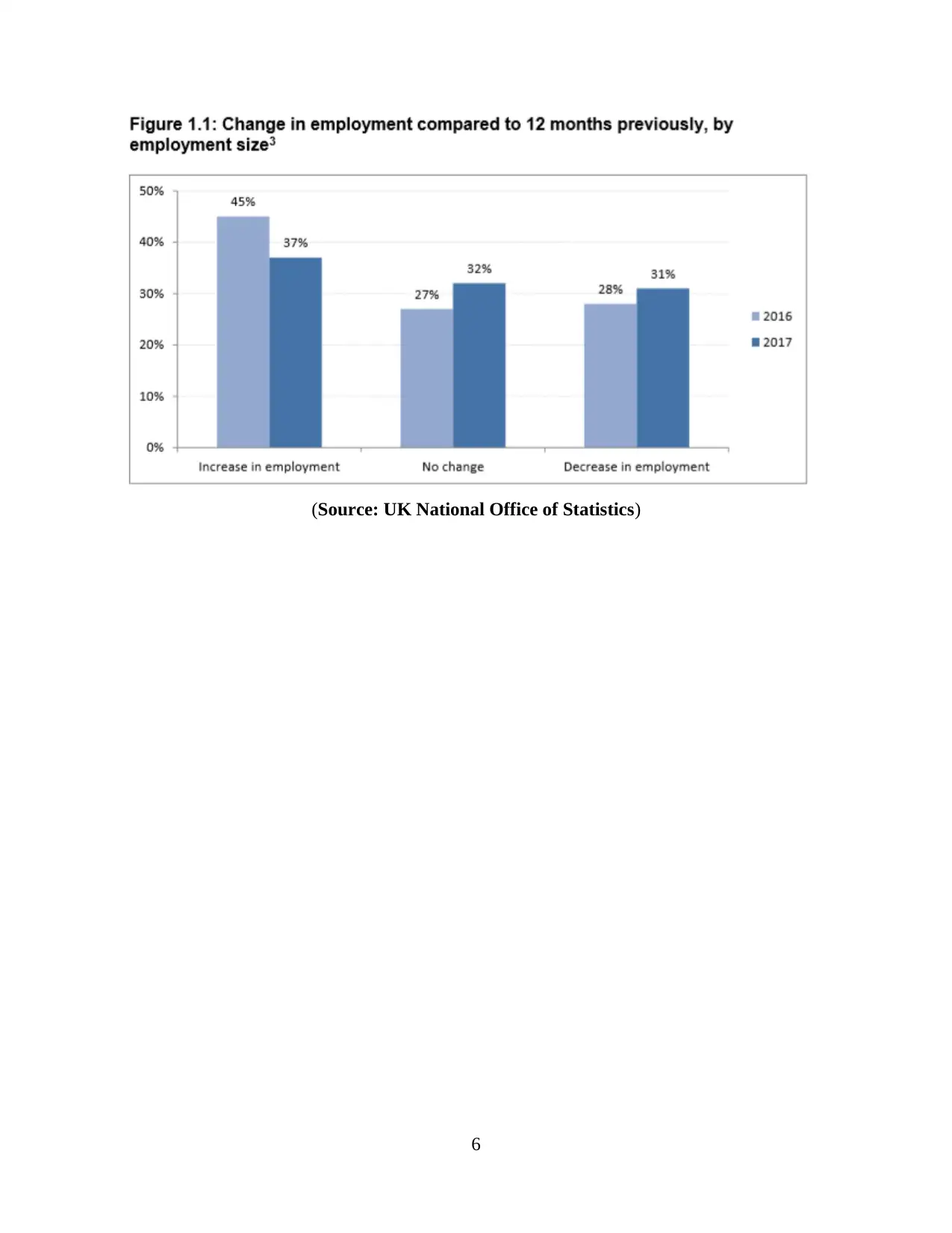
(Source: UK National Office of Statistics)
6
6
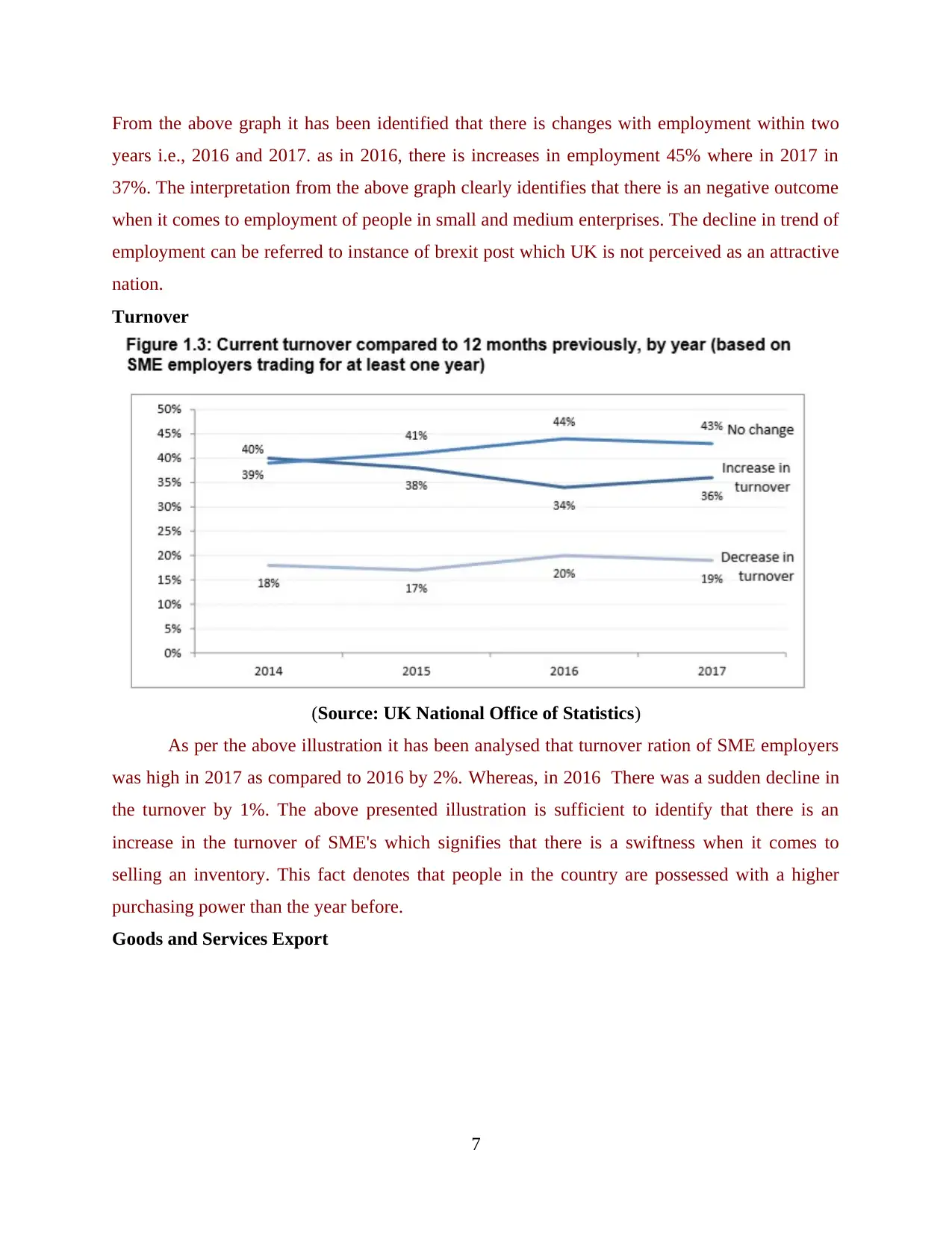
From the above graph it has been identified that there is changes with employment within two
years i.e., 2016 and 2017. as in 2016, there is increases in employment 45% where in 2017 in
37%. The interpretation from the above graph clearly identifies that there is an negative outcome
when it comes to employment of people in small and medium enterprises. The decline in trend of
employment can be referred to instance of brexit post which UK is not perceived as an attractive
nation.
Turnover
(Source: UK National Office of Statistics)
As per the above illustration it has been analysed that turnover ration of SME employers
was high in 2017 as compared to 2016 by 2%. Whereas, in 2016 There was a sudden decline in
the turnover by 1%. The above presented illustration is sufficient to identify that there is an
increase in the turnover of SME's which signifies that there is a swiftness when it comes to
selling an inventory. This fact denotes that people in the country are possessed with a higher
purchasing power than the year before.
Goods and Services Export
7
years i.e., 2016 and 2017. as in 2016, there is increases in employment 45% where in 2017 in
37%. The interpretation from the above graph clearly identifies that there is an negative outcome
when it comes to employment of people in small and medium enterprises. The decline in trend of
employment can be referred to instance of brexit post which UK is not perceived as an attractive
nation.
Turnover
(Source: UK National Office of Statistics)
As per the above illustration it has been analysed that turnover ration of SME employers
was high in 2017 as compared to 2016 by 2%. Whereas, in 2016 There was a sudden decline in
the turnover by 1%. The above presented illustration is sufficient to identify that there is an
increase in the turnover of SME's which signifies that there is a swiftness when it comes to
selling an inventory. This fact denotes that people in the country are possessed with a higher
purchasing power than the year before.
Goods and Services Export
7
⊘ This is a preview!⊘
Do you want full access?
Subscribe today to unlock all pages.

Trusted by 1+ million students worldwide
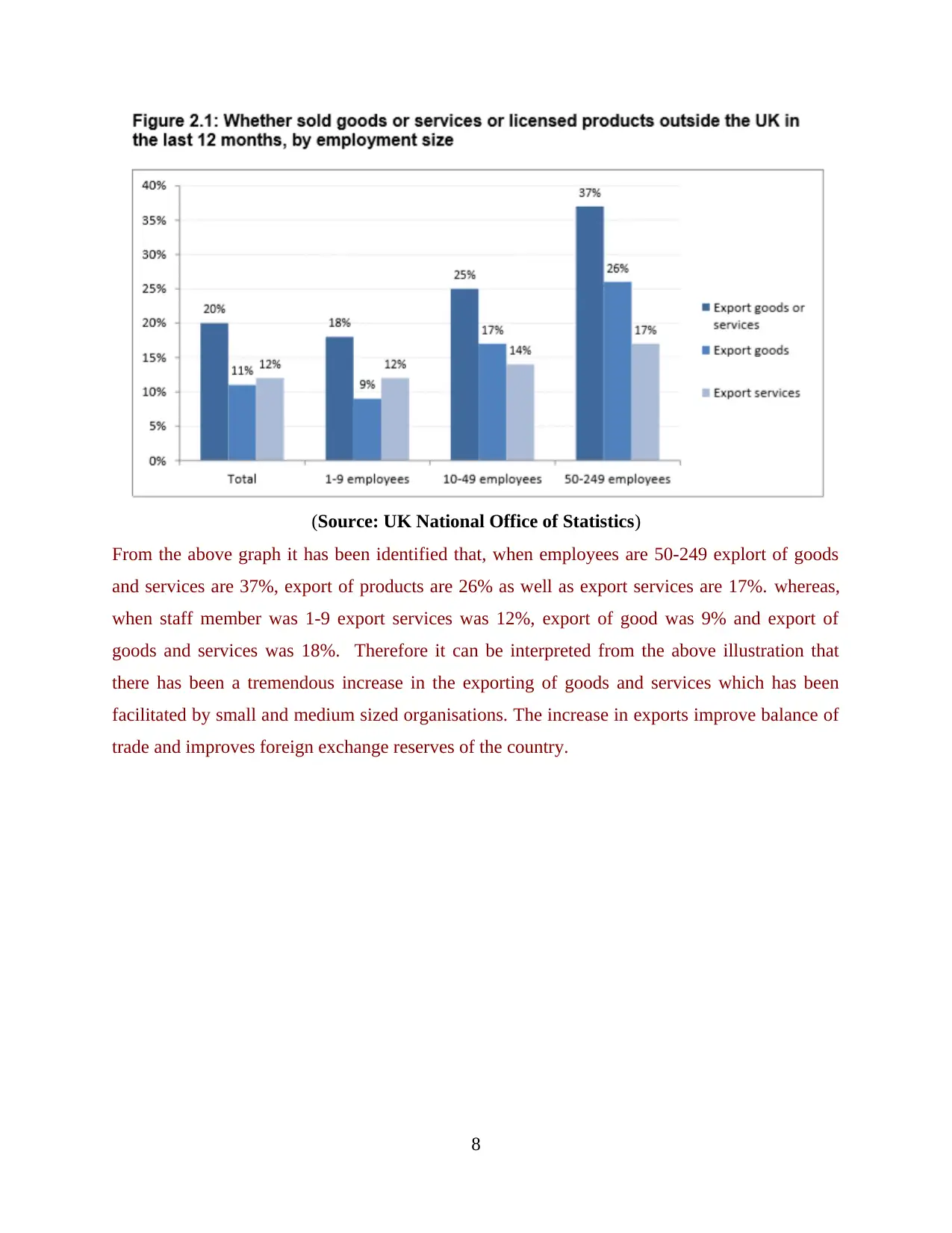
(Source: UK National Office of Statistics)
From the above graph it has been identified that, when employees are 50-249 explort of goods
and services are 37%, export of products are 26% as well as export services are 17%. whereas,
when staff member was 1-9 export services was 12%, export of good was 9% and export of
goods and services was 18%. Therefore it can be interpreted from the above illustration that
there has been a tremendous increase in the exporting of goods and services which has been
facilitated by small and medium sized organisations. The increase in exports improve balance of
trade and improves foreign exchange reserves of the country.
8
From the above graph it has been identified that, when employees are 50-249 explort of goods
and services are 37%, export of products are 26% as well as export services are 17%. whereas,
when staff member was 1-9 export services was 12%, export of good was 9% and export of
goods and services was 18%. Therefore it can be interpreted from the above illustration that
there has been a tremendous increase in the exporting of goods and services which has been
facilitated by small and medium sized organisations. The increase in exports improve balance of
trade and improves foreign exchange reserves of the country.
8
Paraphrase This Document
Need a fresh take? Get an instant paraphrase of this document with our AI Paraphraser
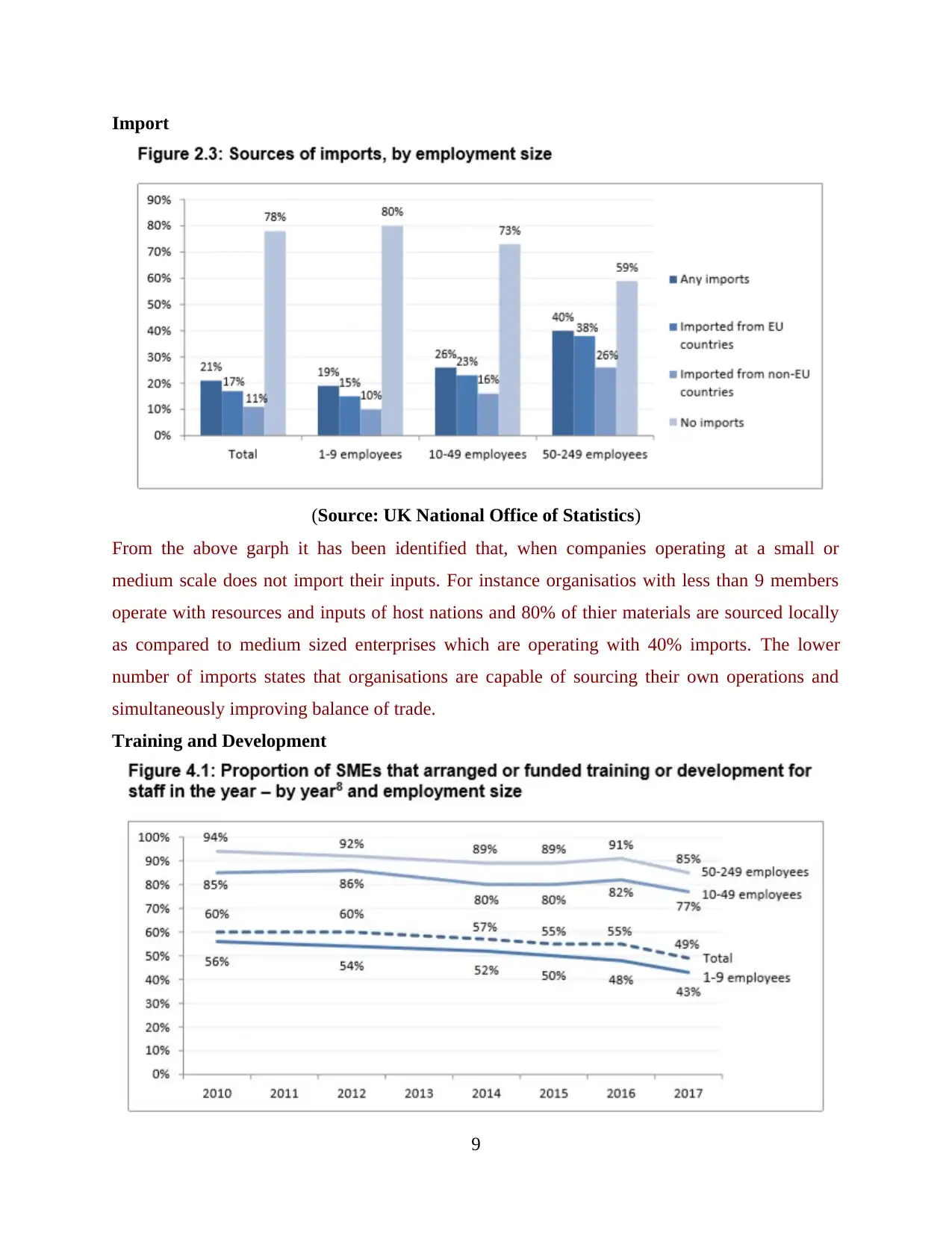
Import
(Source: UK National Office of Statistics)
From the above garph it has been identified that, when companies operating at a small or
medium scale does not import their inputs. For instance organisatios with less than 9 members
operate with resources and inputs of host nations and 80% of thier materials are sourced locally
as compared to medium sized enterprises which are operating with 40% imports. The lower
number of imports states that organisations are capable of sourcing their own operations and
simultaneously improving balance of trade.
Training and Development
9
(Source: UK National Office of Statistics)
From the above garph it has been identified that, when companies operating at a small or
medium scale does not import their inputs. For instance organisatios with less than 9 members
operate with resources and inputs of host nations and 80% of thier materials are sourced locally
as compared to medium sized enterprises which are operating with 40% imports. The lower
number of imports states that organisations are capable of sourcing their own operations and
simultaneously improving balance of trade.
Training and Development
9

(Source: UK National Office of Statistics)
In comparison of 2016 and 17, SMEs was providing training to employees was high in 2016 as
there are providing training to 50-249 staff members as it get decrese in 2017 by 6%. This stands
in correlation with the decline in the employement which has been carried out in the country.
However there has been postitive shifts when it comes to turnover and exports in the country
which are sufficient to state that there has been a lesser requirement when it comes to organising
training and development activities in such enterprises.
10
In comparison of 2016 and 17, SMEs was providing training to employees was high in 2016 as
there are providing training to 50-249 staff members as it get decrese in 2017 by 6%. This stands
in correlation with the decline in the employement which has been carried out in the country.
However there has been postitive shifts when it comes to turnover and exports in the country
which are sufficient to state that there has been a lesser requirement when it comes to organising
training and development activities in such enterprises.
10
⊘ This is a preview!⊘
Do you want full access?
Subscribe today to unlock all pages.

Trusted by 1+ million students worldwide
1 out of 19
Related Documents
Your All-in-One AI-Powered Toolkit for Academic Success.
+13062052269
info@desklib.com
Available 24*7 on WhatsApp / Email
![[object Object]](/_next/static/media/star-bottom.7253800d.svg)
Unlock your academic potential
Copyright © 2020–2026 A2Z Services. All Rights Reserved. Developed and managed by ZUCOL.





